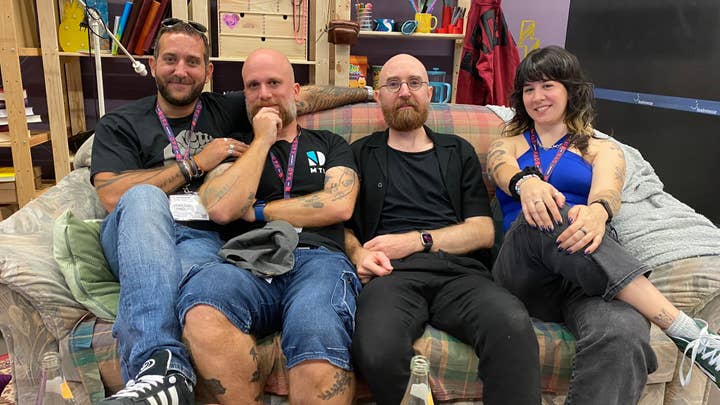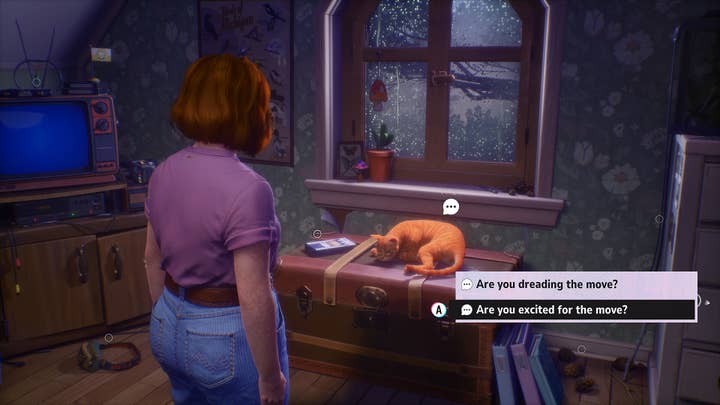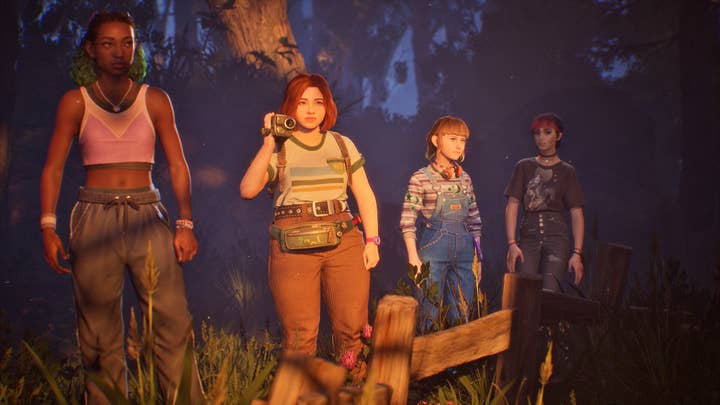Don't Nod's journey from Life Is Strange to Lost Records: Bloom and Rage
We talk to Don't Nod Montréal about the lessons learned from its most popular series, and how its new IP continues the studio's narrative-driven focus
Four years ago, Don't Nod Montréal opened its doors to produce its first title outside the Life Is Strange franchise.
Work immediately began on what would become Lost Records: Bloom and Rage, created by the team that brought the first two Life Is Strange games to life.
GamesIndustry.biz caught up with creative director Michel Koch, studio executive producer Luc Baghadoust, and producer Cathy Vincelli at Gamescom to talk about how Lost Records marks a new direction for the developer, but continues its tradition of producing narrative-driven games centred around choices and consequences.
Initially set to launch in late 2024, Don't Nod pushed the release of its new IP to early 2025 to avoid clashing with the next instalment of Life Is Strange, Double Exposure, now developed by Deck Nine.
"We talked about it, and thought the best solution was to give [Lost Records] more space," studio executive producer Luc Baghadoust explains. "We know that a big part of the audience knows the Life Is Strange name, but they might not know that the original team of the first two games is creating a new game, and there needs to be room for two."
Baghadoust says that overall, it was a "good outcome" for them.
"Fans might not know the original team of Life Is Strange is creating a new game, there needs to be room for two"Luc Baghadoust, Don't Nod Montréal
"On our end, it gives us more time to polish the content to make sure it's great when it's released," he continues. "Being too close to each other, people might not have the budget to buy two games, so giving us more space was the best solution."
There is added pressure on Lost Records following Don't Nod's latest financial results, in which the company paused two projects after Jusant and Banishers: Ghosts of New Eden "performed well below expectations."
With Lost Records now the firm's crucial next release, we reached out for additional comment from Don't Nod, but the request was declined.
Production on Lost Records began in 2020, but the concept came to creative director Michel Koch while presenting Life Is Strange 2 at Gamescom in 2019.
"We started to talk not only about [a group of] teenage girls, but also adults with characters our own age to have a different point of view," Koch says.
Lost Records alternates between two timelines: the present day and the '90s. Producer Cathy Vincelli notes that the latter was chosen as the development team's "formative years".
"We were around the same age as the girls in the game, so a lot of us felt a sense of nostalgia," Vincelli says. "It's the point in our lives where we were a little bit awkward and figuring ourselves out. It allowed us to draw inspiration from our own experiences while also doing research about stuff from the time. But because so many of us lived through it, we were able to bring that into the game as well."
The team looked to media from the era for inspiration, particularly Twin Peaks, which Koch says helped balance the game's overarching supernatural elements. In terms of visuals and style, Lost Records also drew inspiration from female-centric films, including Foxfire and The Craft, as well as games such as Oxenfree and Night in the Woods.
Despite being Don't Nod Montréal's first IP outside the Life Is Strange franchise, the series heavily influenced Lost Records, adapting and evolving the studio's penchant for narrative-driven games.
"We've been working on these kinds of games for over a decade now," Koch notes. "We love storytelling and making interactive narratives that players can tell their own stories through in a way."
The team learned a significant lesson developing Life Is Strange: "Characters are key."
"That's something we saw in each Life Is Strange episode, that the characters are at the centre of everything," Koch notes. "Players will always remember good characters – we really wanted to focus on that."
Focusing on the characters helped maintain that balance, especially in ensuring they were relatable enough for players to connect with.

"Characters are the most important thing in our games," Koch says. "We like to say if you don't have good characters, no matter how good the story may be, it won't work. You need good characters to make players engaged with the story."
Koch emphasises that by starting with archetypes, the personalities of each of the characters come soon after.
"With our four girls, we have some very classic archetypes. At the beginning, we have Swann, who is an introvert. Nora is the outgoing one who feels like way too much, Cat is more like the fierce, small ball of energy that is very direct, and Autumn is chill and laid back but very knowing in what she wants and being the leader of the group."
They then add a second layer, which Koch explains by using Noah as an example.
"Even if she feels very outgoing and strong, she has a lot of frailty to her, and she is very insecure. We make and write characters that feel like real people we may have interacted with in our teenage years.
"That also influenced how we designed them; as you can see with Nora, she has acne and some marks on her cheeks. We tried to design body shapes that look like real people – even with the clothing, nothing is perfect. Looking back at pictures from our yearbooks, it looks real but weird."
Koch said the team also wanted to ensure they were adapting to an ever-evolving industry.
"We want to make sure we are not making games that are too passive, but also not just interactive movies," he explains. "So that's why we brought new features into Lost Records, like the camcorder and the dialogue system, to engage with our players dynamically to ensure they're not getting bored or disconnected.
"If you don't have good characters, no matter how good the story may be, it won't work" Michel Koch, Don't Nod Montréal
"That's something we're trying to evolve in general, to make improvements to some of the systems to make sure the player is in control and the game is more reactive rather than just following what it tells you to do."
The focal point of Life Is Strange was the dialogue options, in which every choice impacted the narrative's outcome. This framework returns in Lost Records, but it's been expanded to make social interactions more realistic for the player.
"We try to have a very natural dialogue system," Vincelli says. "That's why when you're going up to someone to speak to them, it's not necessarily just a talk interaction. You can choose how you want to get into that conversation – maybe being a little bit more shy or outgoing."
Vincelli says they wanted to make the conversations feel more realistic rather than just being presented with two or more dialogue options to push the interactions along for the sake of the narrative.
"Conversations can sometimes be chaotic when you're with a bunch of friends talking to each other," she continues. "But there are also moments where it's slower and paced out. We wanted to maintain that balance of having those natural, chaotic moments when everyone's excited and talking, then other moments where you can pause or not say anything."
The dialogue system in Lost Records is immensely detailed, which must have been difficult to script.

"Yes," Koch laughs. "It's always a thing when we're fine-tuning because we want to find the right balance between making sure it feels real, that people are really talking to each other, that we provide windows of opportunity that you can miss if you want to say something then it's too late because they're talking to someone else.
"But we also want the player not to feel overwhelmed; we want them to guess what's happening. And as it's a video game, you don't have all your real senses to see the people moving around you. You're looking through the window of a screen, so we still need to make it slightly slower sometimes. Hopefully, we are reaching the point where we achieve what we want and still make it legible enough for the players."
Vincelli points back to that foundation of developing distinct characters, which is vital in helping players connect with them – especially through the dialogue choices.
"We wanted to maintain that balance of having those chaotic moments when everyone's talking, then other moments [to] pause or not say anything"Cathy Vincelli, Don't Nod Montréal
"I think that's what's interesting about our game: The characters are so well developed," she says. "You really get to know each of the girls, even though you're just playing as Swann. You'll know what they would do or what they would think – that's why when you're presented with certain options, hearts will appear in the replies. You'll understand what these girls like and dislike and what's integral to their personalities."
The overall goal with Lost Records was to make it even more reactive than Don't Nod's previous titles, particularly Life Is Strange.
"You're mostly always in control, and things are happening based on what you're looking at, what you're interacting with," Koch says, highlighting the ability for players to pick up and interact with an array of items from video tapes, books, and trinkets.
"The game has to work for people who want to play straight and to the point. But we also put a lot of details in for players who [want to interact with everything]."


